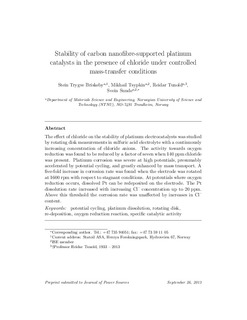Stability of carbon nanofibre-supported platinum catalysts in the presence of chloride under controlled mass-transfer conditions
Journal article
Submitted version
Permanent lenke
http://hdl.handle.net/11250/2464355Utgivelsesdato
2014Metadata
Vis full innførselSamlinger
- Institutt for materialteknologi [2540]
- Publikasjoner fra CRIStin - NTNU [37733]
Sammendrag
The effect of chloride on the stability of platinum electrocatalysts was studied by rotating disk measurements in sulfuric acid electrolyte with a continuously increasing concentration of chloride anions. The activity towards oxygen reduction was found to be reduced by a factor of seven when 140 ppm chloride was present. Platinum corrosion was severe at high potentials, presumably accelerated by potential cycling, and greatly enhanced by mass transport. A five-fold increase in corrosion rate was found when the electrode was rotated at 1600 rpm with respect to stagnant conditions. At potentials where oxygen reduction occurs, dissolved Pt can be redeposited on the electrode. The Pt dissolution rate increased with increasing Cl− concentration up to 20 ppm. Above this threshold the corrosion rate was unaffected by increases in Cl− content.
